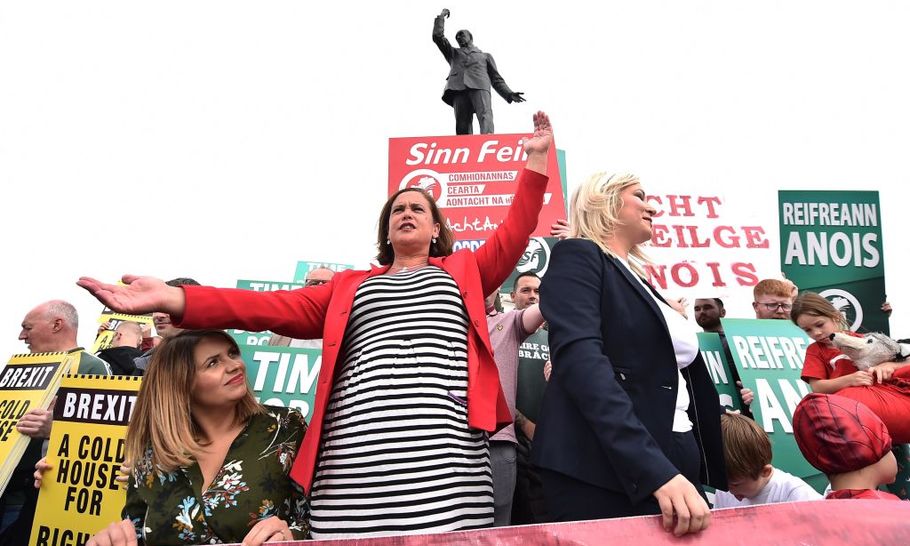Pacts in Northern Ireland threaten to benefit Sinn Féin

Charles McQuillan/Getty Images
This general election campaign is expected to be the most vicious in recent memory, as sharp differences over EU membership infuse politics across the UK with a new sense of tribalism. In Northern Ireland, where Brexit deepens existing divisions over nationality and identity, that trend is expected to be even worse.
Already, competing parties have announced a series of withdrawals, mutual understandings and pacts that will exacerbate the tendency for elections in Ulster to become sectarian headcounts. Some of the participants claim these arrangements are designed to ensure that winning candidates support remaining in the EU, but the green and orange colours beneath that veneer are barely hidden.
The idea of pacts isn’t new, either on the unionist or nationalist side, but their prevalence this time is unusual.
In 2017, for example, the DUP supported the sitting Ulster Unionist MP, Tom Elliott, in Fermanagh South Tyrone. He was viewed as the best-placed candidate to defeat Sinn Féin, which refuses to take seats at Westminster, but he lost by 875 votes and the constituency was deprived of representation. In that campaign, the UUP declined to run in North Belfast, where the DUP’s Nigel Dodds won narrowly against Sinn Féin’s John Finucane.
Initially, it seemed that the UUP would refuse to get involved in similar arrangements this time. Less than two weeks ago, its leader designate, Steve Aiken MLA, stated unequivocally that the party would contest all eighteen constituencies in Northern Ireland.
After intense pressure from unionists in North Belfast, Aiken reversed his decision and announced that the UUP would stand aside there after all. The DUP had already made a similar undertaking in Fermanagh, South Tyrone.
De facto pacts among unionists, aimed at preventing abstentionist Sinn Féin MPs from winning seats, were not unexpected. Less easily anticipated were the withdrawals that followed from nationalist and non-aligned parties.
The SDLP, which previously opposed Sinn Féin’s abstentionism and its justification of IRA violence, withdrew its candidate from the North Belfast race, to assist Mr Finucane. In extraordinary times, the party said, extraordinary measures were required to return a Remain MP. For its part, Sinn Féin announced that it will not stand in South Belfast, offering the SDLP’s Claire Hanna a strong opportunity to unseat DUP MP, Emma Little-Pengelly.
The Green Party has also declared support for Ms Hanna.
Both the SDLP and Sinn Féin have undertaken not to contest East Belfast, where the Alliance Party is the strongest rival to the DUP’s Gavin Robinson, and North Down, where Lady Sylvia Hermon hopes to defend her seat from the DUP. Alliance does not designate as unionist or nationalist and Lady Hermon describes herself as an ‘independent unionist’, so the nationalist parties can dress their antics up as pro-Remain rather than anti-unionist.
However, neither party has any support to speak of in these two strongly pro-Union constituencies. Their withdrawals are exceptionally unlikely to affect the results meaningfully, while they’ll save candidate deposits, campaign resources and a little face.
Previously, the SDLP argued that it couldn’t agree to cooperate with Sinn Féin, because its candidates refused to take their seats. In the Foyle constituency, the party’s leader, Colum Eastwood, is campaigning to replace the sitting Sinn Féin MP on the basis that “change is made by people who turn up”. Now, it’s encouraging SDLP voters in North Belfast to support a candidate who is standing on an abstentionist platform.
Yesterday, it emerged that the Shankill bomber, Sean Kelly, canvassed with Sinn Féin in North Belfast. Mr Kelly was convicted of murdering nine people, including two children, when the IRA attacked a fish shop on Belfast’s Shankill Road, during a busy Saturday afternoon in 1993. The Old Bailey bomber, Gerry Kelly, who formerly contested the North Belfast seat, is also connected closely with Mr Finucane.
The idea that Brexit justifies assisting such people is deeply amoral. The Alliance Party, which is staunchly in favour of remaining in the EU, has so far refused to get involved in pacts, even though its leader, Naomi Long, may benefit from the manoeuvring in East Belfast.
Whether or not the arrangement is formal, standing aside in favour of Sinn Féin is not like stepping aside for another candidate. Claire Hanna is a moderate SDLP figure, who attracts little animosity from unionists in South Belfast. But, if she takes the seat this time, she will almost certainly have won courtesy of Sinn Féin votes bought through a deal that could put unrepentant bombers and murderers on the winning side elsewhere in the city.





